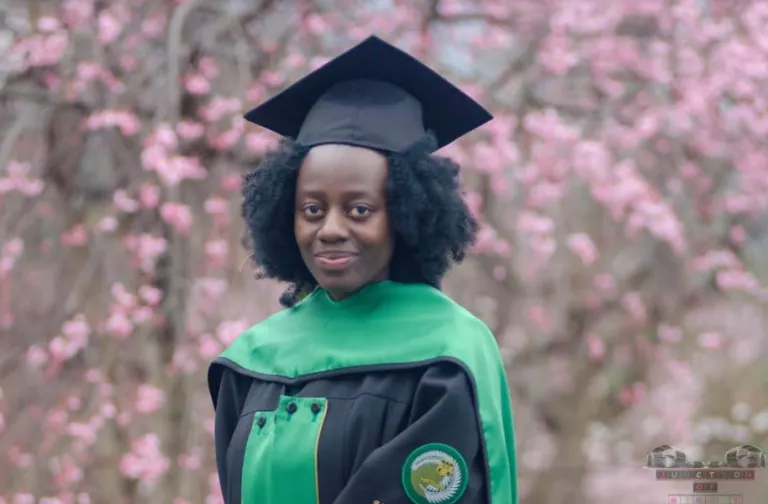By Pauline Luba
“A name is so important. A surname connects you to your past, to your family.” This quote is attributed to Canadian author Kelley Armstrong.
The life of Joyce Nakayenga, a new recipient of a PhD in engineering, is aligned with the writer’s assertion. Named after her paternal grandmother, Nakayenga grew up knowing that she had to uphold that matriarch’s legacy of hard work and overcoming challenges. Nakayenga’s grandmother struggled to educate her children despite having so little.
When Nakayenga was awarded a Doctor of Philosophy in Engineering – Civil and Environmental Engineering from Hiroshima University in Japan on March 23, 2023, and as other members of her family as well as friends looked on, her grandmother’s spirit was ever present. With the degree, the 31-year-old also won three prestigious university awards. Her research earned her the Best Presentation Researcher, Academic Encouragement Award and the 2022 Hiroshima Excellent Student Award.
For many who know Nakayenga’s academic ability, the latest attainment likely isn’t surprising. In 2015, she was not only a recipient of a First-Class degree in Bachelor of Science in Civil and Environmental Engineering at Uganda Christian University (UCU), but also had the best marks in her class. For that feat, she earned an academic excellence award at UCU. Consequently, UCU’s Department of Engineering and Environment hired Nakayenga as a tutorial assistant for one year.
“I have always wanted to be an engineer,” Nakayenga told Uganda Partners. “I wanted a profession that showed where I could visibly see the fruits of my work thereafter.”
UCU’s location within her home district – Mukono – and its deep roots in Christianity were a good fit for Nakayenga’s higher education choice.
Nakayenga notes that the UCU community, including its lecturers, were instrumental in ensuring concentration in books, overall performance and continued learning. For instance, a former lecturer at UCU brought her attention to the existence of the Mext scholarship to study at Hiroshima. Nakayenga enrolled for a master’s at the university in 2017 and the scholarship was extended to doctorate studies because she had passed the first post-graduate hurdle with flying colors.
Nakayenga describes herself as someone “keen on promoting sustainable societal development, especially for developing countries, through innovative engineering solutions.” Her PhD research, under the topic “The re-use of stone quarry waste (i.e granite and limestone powder) to improve the properties of weak clay soils,” gives her the competence to be able to develop “sturdy infrastructure that will stand the test of time and natural disasters.” The research focused on how to make naturally weak clay soil strong, by using stone powder.
Nakayenga is the fifth born of six children of Dr. Wilson Mubiru and Specioza Nabatanzi Mubiru. Nakayenga’s family had to use resources sparingly, having at one time been an extended family of up to 18 members living under one roof. Her parents, now retired, were public servants. Wilson was the officer in charge of health in central Uganda’s Mubende district while Specioza served as an education officer in the same district.
Nakayenga attended Mubende Parents School for her primary education and Nabisunsa Girls School for her secondary education before joining UCU. Nakayenga balanced academics and student leadership roles at every school she attended. At Mubende Parents School, she was the assistant head prefect. At UCU she represented her faculty in the UCU students’ parliament. At Hiroshima University, from 2017 to 2018, Nakayenga was the university’s Study Abroad Ambassador, where she sensitized students on the benefits of studying in the Hiroshima Prefecture (municipality).
For now, she will remain in Hiroshima, where the university has employed her as a postdoctoral researcher in the geotechnical laboratory of Hiroshima University.


